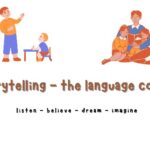The Connection Between Storytelling and Language Development
Language development is a key part of childhood growth, and storytelling provides a rich environment for children to develop and expand their linguistic abilities. Here are some ways storytelling contributes to language skills:
Vocabulary Expansion
- Rich Vocabulary: Through storytelling, children are introduced to new words and phrases. Hearing a variety of vocabulary in different contexts allows them to absorb and use these words in their own speech. For example, listening to a story about a forest adventure can introduce words like “bark,” “canopy,” “squirrel,” and “meadow” that might not come up in everyday conversations.
- Contextual Learning: When children hear new words in a meaningful context (such as in a story), they are more likely to understand their meanings and remember them.
Sentence Structure and Grammar
- Complex Sentences: Stories often contain a variety of sentence structures, from simple to complex. By hearing these structures, children learn how sentences are put together, improving their understanding of grammar.
- Story Patterns: Repeated story elements—like “once upon a time,” “the hero faces a challenge,” and “happily ever after”—help children understand narrative structure and how ideas can be organized logically.
